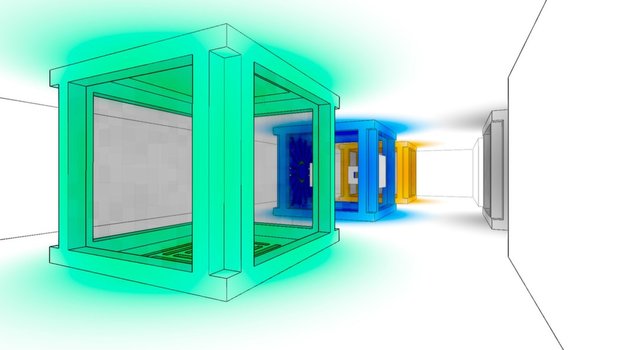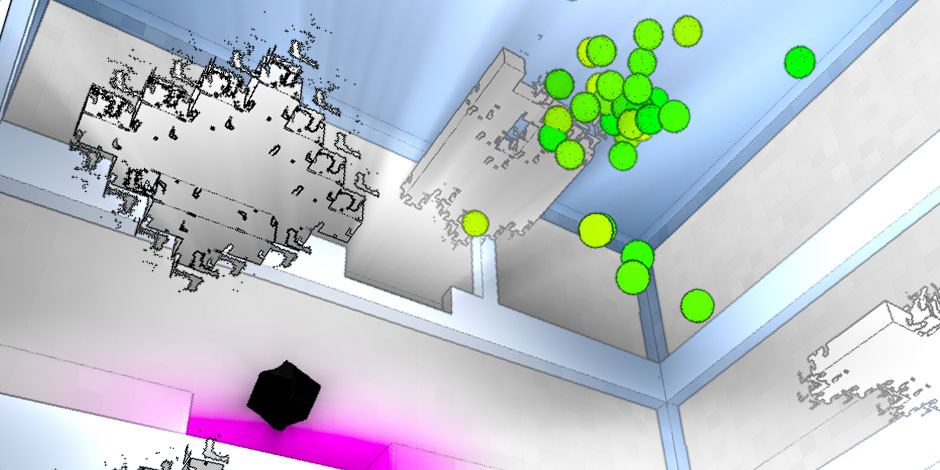GamesRadar+ Verdict
Pros
- +
Challenging and unique puzzles
- +
Simple and clean visual style
- +
Your own personal eureka moments
Cons
- -
Intensely difficult at times
- -
Map layout can get confusing quickly
- -
Not knowing where to go next
Why you can trust GamesRadar+
After a few minutes inside the white hallways of Antichamber, you’ll realize your surroundings are not what they seem. Floors will disintegrate, staircases will rise and fall without end, and what you know about how things work will go out the window. Its visual style may make it look almost too simple, but underneath that stark veneer is a challenging first-person puzzler filled with subtle complexity. You won’t always know what you need to be doing, but that feeling of uncertainty coupled with a drive toward discovery is what makes Antichamber such a unique journey.
Antichamber feels barren. The game’s black-and-white geometric textures make its rooms look empty and feel almost cold. Even when later levels introduce bright colors into the scenery, the splashes of neon don’t seem natural or complement anything around them. You won’t know where or who you are, and the game’s nonexistent plot and lack of narrative don’t offer much help situating you either. Your environment essentially becomes delusive, creating a fitting accompaniment for the bewildering puzzles you’ll soon discover.

"You won’t always know what you need to be doing, but that feeling of uncertainty coupled with a drive toward discovery is what makes Antichamber such a unique journey."
Just like its art style, Antichamber’s puzzles skew toward simplistic--that is, once you’ve figured them out. Instead of flashy rooms with lots of levers to press and things to jump on, what you get is many rooms that play with how you perceive reality and, fundamentally, how you approach a game. If you come across a sign that says “Jump” and decide to trust it, you’ll end up falling and landing in a room where a message on the wall advises you to not believe everything you see. You can never die in the game, so you’ll need to make mistakes and learn from them to solve each puzzle. Its lack of direct guidance forces you to teach yourself how to play, making each “Eureka!” moment all the more invaluable and each solution all the more fulfilling.
Once you start playing, you’re basically left to figure things out on your own. The game’s objective is to figure out what a room’s problem is, solve it, and move onto the next room. A puzzle can involve staring at an object so that it will move, entering a room backwards to prevent its door from closing, or walking in circles around a seemingly endless path to reach its exit. The game’s design approach not only encourages trial and error, but also forces you to closely analyze your surroundings, no matter how plain they may be. And because each obstacle essentially defies what you thought you knew about space and physics, it makes the experience all the more challenging.

"The game’s design approach not only encourages trial and error, but also forces you to closely analyze your surroundings, no matter how plain they may be."
Discovering where to go next and ultimately reaching that elusive exit are, of course, what will drive you to solve every puzzle. The first room you’ll end up in doubles as the game’s menu screen, and acts as a hub for all of the rooms you’ve already discovered. At any point in the game, you can return to this room, and if you do so, the room you were just in will reset. Some rooms are multi-leveled and have multiple entrances so even the basic concept of moving between rooms becomes a unique and satisfying puzzle unto itself.
Antichamber finds strength in its simplicity. Its puzzles aren't convoluted, the solutions are usually always staring you in the face, and yet still the game is challenging. Not everyone will appreciate the game's minimalist elegance, but Alexander Bruce’s approach to game design can't be labeled as anything but clever.
More info
| Genre | Puzzle |
| Description | Antichamber is a mind-bending psychological exploration game where nothing can be taken for granted. Discover an Escher-like world where hallways wrap around upon each other, spaces reconfigure themselves, and accomplishing the impossible may just be the only way forward. |
| Platform | "PC" |
| US censor rating | "Rating Pending" |
| UK censor rating | "" |
| Alternative names | "Hazard: The Journey of Life" |
| Release date | 1 January 1970 (US), 1 January 1970 (UK) |



